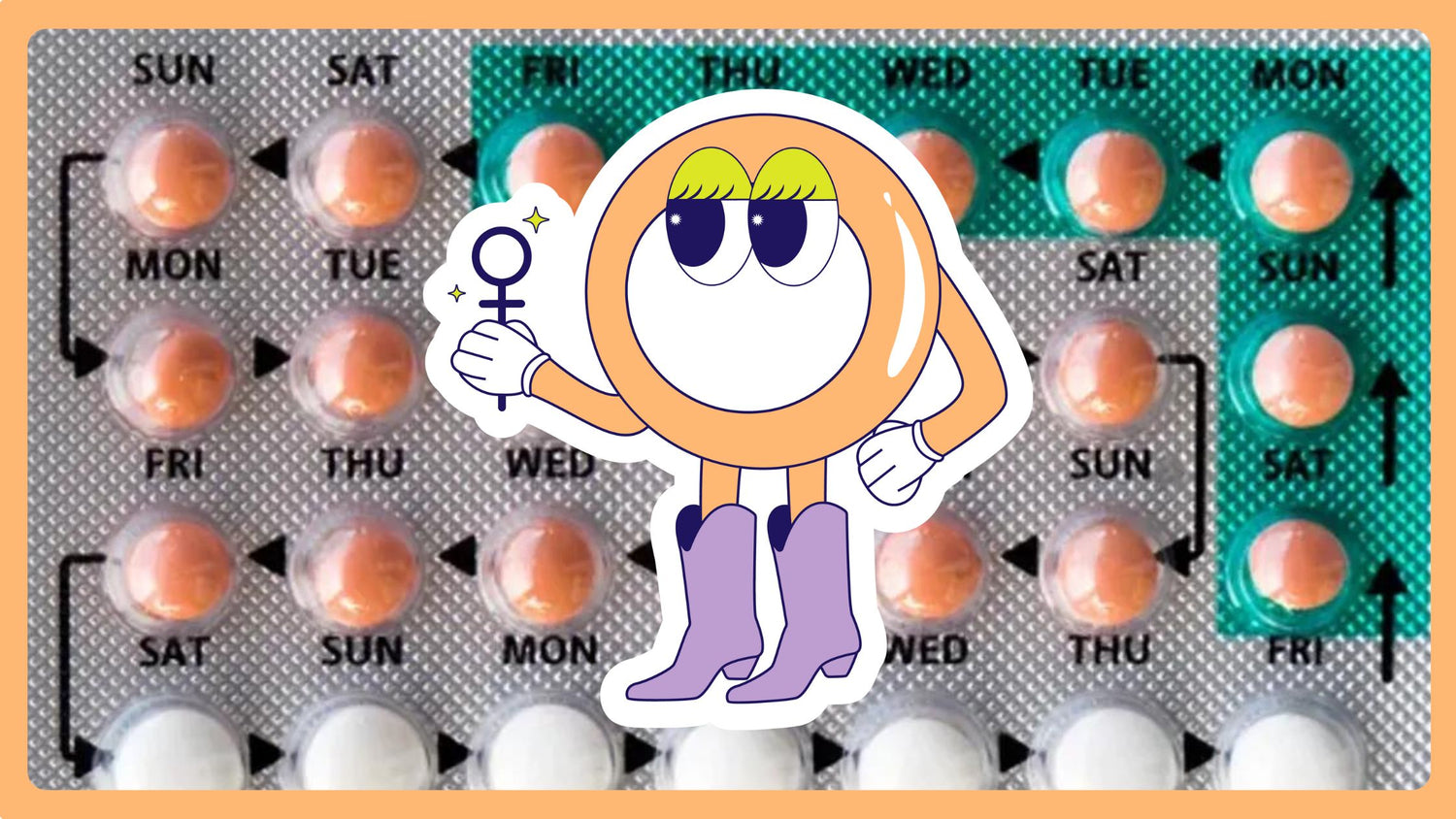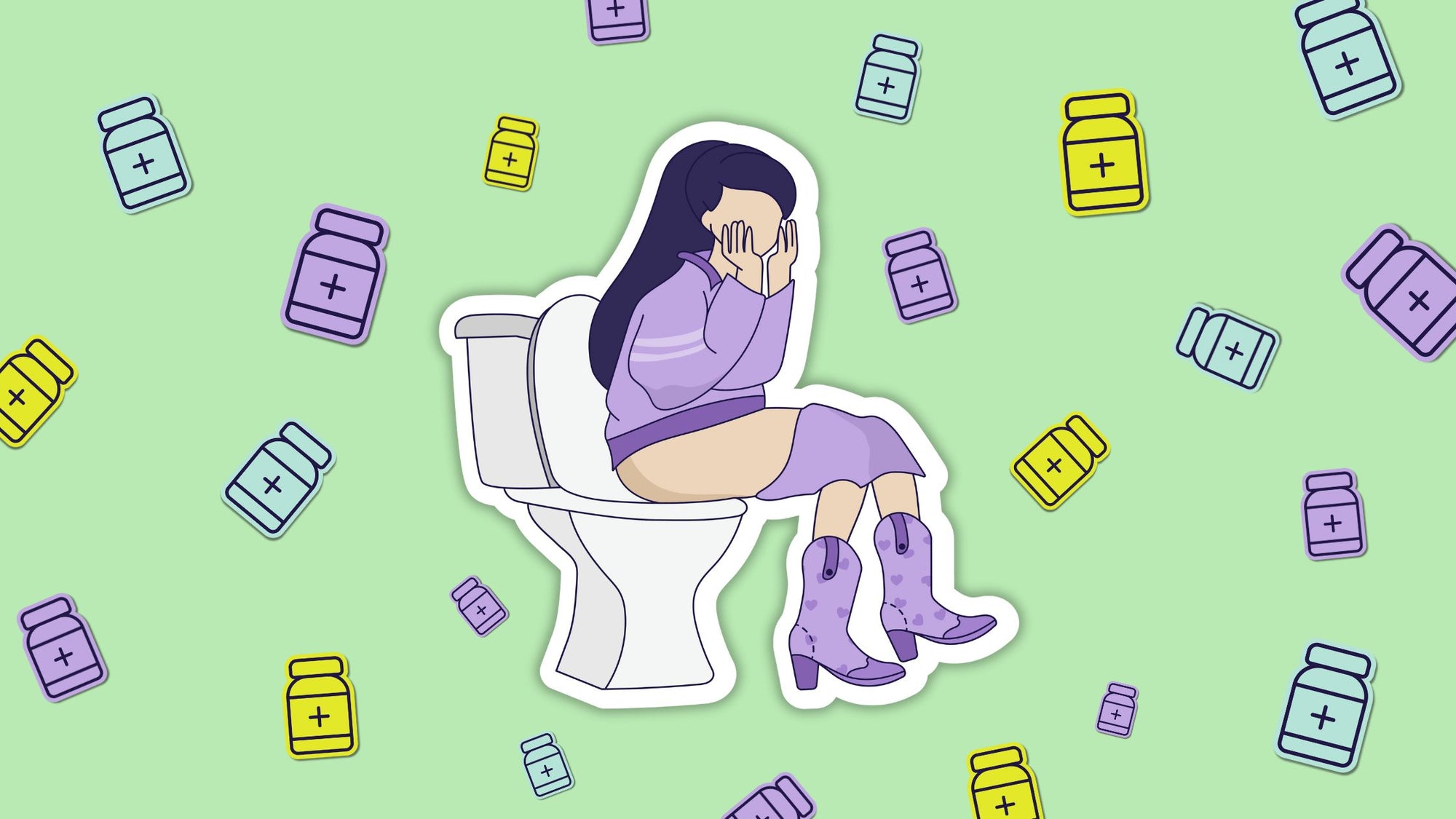Hormonal bloating is a common side effect for those who are on hormonal birth control, of which there are many different kinds. Women may be given an implant, an intrauterine device (IUD), injections, or tablets to be taken orally as forms of hormonal-based contraception.
You might have been on hormonal birth control yourself. Maybe you’re still on it, you’re thinking about going on it, or you never want to take it but are curious to learn more about it.
Regardless of where you lie on the metaphorical hormonal birth control spectrum, we believe it’s good to learn more about what it is, what it does, and its potential side effects like gas, bloating, and water retention. Hormonal birth control can be beneficial for some women, but it’s not a one-size-fits-all, and it doesn’t work well for everybody.
In this article, we’re going to cover what hormonal birth control is and the different types that are available in the modern day.
What is Hormonal Birth Control?
Hormonal birth control was first invented in the 1960s, with the first-ever pill being Enovid, which contained mestranol and norethisterone.
We won’t go into the history of hormonal birth control too much, but the main thing to note is that its use has significantly increased in the last two decades. Millions of women take regular and ongoing birth control, either for prevention of pregnancy or to control erratic periods (although it’s important to realise that birth control doesn’t resolve underlying issues with the menstrual cycle. It simply masks them and reduces the associated symptoms).
Although birth control can be effective for suppressing ovulation and, therefore, preventing unwanted pregnancies, it is known to cause side effects. These side effects mimic the effects of the body’s endogenous (self-made) reproductive hormones, including oestrogen and progesterone.
The most common side effects associated with hormonal birth control include bloating, water retention (oedema), abdominal pain, fatigue, headaches, mood swings, nausea, dizziness, sore breasts, and acne. Some studies have even linked hormonal birth control with an increased risk of depression and anxiety.
What Are the Types of Hormonal Birth Control?
There are a few different kinds of hormonal birth control, each working in slightly different ways and providing different levels of the main reproductive hormones.
In most countries, the birth control pill, which most of us know as ‘the pill’ is the most common form of hormonal birth control prescribed to women. However, there are additional kinds of hormonal birth control used as contraceptives, including the intrauterine device (IUD), hormone-based coils, vaginal rings, and skin patches.
Hormonal contraceptives have different mechanisms to prevent pregnancies. Some reduce the amount of cervical mucus (colloquially known as discharge) that is secreted into the cervix or cause it to become stickier and harder for sperm to move through (thereby reducing the chance of sperm reaching the egg in the fallopian tube if a woman is ovulating).
Others prevent the egg from being released in the first place (they prevent ovulation), and others thin the uterine lining to make it too thin for a fertilised embryo to successfully implant into the womb.
How Does Hormonal Birth Control Cause Bloating?
Bloating is one of the common side effects (if not the most common side effect) of birth control. It does so in the following ways.
They increase water retention
Many hormonal contraceptives, particularly the birth control pill, can increase the volume of fluid retained by the body. This is because they contain synthetic versions of oestrogen and progesterone, both of which can cause water retention.
Oestrogen is mostly to blame for this because it causes the kidneys to reabsorb more sodium and water. This excess fluid retained in the body can get pushed out of the bloodstream and into the tissues, causing swelling (oedema) that is especially prevalent in the lower legs and feet.
They can reduce gut motility
Progesterone slows down the movement of food through the digestive tract. It does so to increase the time your body has to absorb nutrients from the foods you’re eating so you can provide more of them for your growing baby if you’re pregnant. Clever, right?
Delayed gastric and colonic emptying can increase the risk of constipation and bloating. It also allows for more time for your gut bacteria to ferment the fibres in the foods you’ve eaten, causing more gas to build up in your lower digestive tract and increasing burping and flatulence.
They can change the composition of the gut microbiome
The hormonal fluctuations that birth control can impact your gut bacteria. Changes in oestrogen and progesterone can alter the amounts of different species of bacteria in your colon, potentially increasing fermentation and gas production or slowing down the rate of food breakdown. This can, in turn, increase gas and bloating.
They can increase inflammation in the gut
Some forms of hormonal birth control can increase inflammation in the body. Although everybody can react differently to synthetic hormones, and some people can have a more intense inflammatory response to them, gut inflammation is a known side effect of hormonal contraceptives that can negatively impact digestion.
Often, those with a pre-existing inflammatory condition, such as irritable bowel syndrome (IBS) or inflammatory bowel disease (IBD), experience worsening gut health and more severe bloating on hormonal birth control because it can enhance inflammation within the gut.
How Can I Stop Bloating from Hormonal Birth Control?
If you’re dealing with bloating because you’re on a form of hormonal birth control, there are lots of different lifestyle modifications you can make and helpful strategies you can use to reduce your digestive issues and relieve bloating quickly.
We’ve covered some of our top bloat-busting tips and strategies for you to try below.
Take a daily probiotic supplement
Probiotic supplements, such as A Dose For Bloating (which our customers love!) are highly effective for relieving bloating and gas. A probiotic supplement that contains at least two billion probiotic bacterial colony forming units (CFUs) is ideal, as this is recommended as the minimum amount of CFUs to elicit a noticeable response.
Our supplement contains two billion probiotic bacteria (alongside seven digestive enzymes and seven plant extracts) and may be the answer to your hormonal bloating. Eight out of ten customers notice a significant reduction in their bloating after just two weeks of taking a daily capsule of A Dose For Bloating.
Taking a daily probiotic supplement boosts the levels of beneficial bacteria in your gut, enhancing your digestion and metabolism. Either faster and more efficient metabolism and a healthy gut lining (which probiotics also help to maintain), you’re less likely to experience bloating, even when you’re taking hormonal birth control.
Consume more potassium and less sodium in your diet
Sodium and potassium are essential electrolytes for the human body. They enable your nervous system to send signals, your heart to beat, and your kidneys to filter your blood effectively. However, as essential as they are, there is too much (or too little) of a good thing.
When you’re dealing with a lot of hormonal bloating, it could be partly due to your diet. If you’re consuming too much sodium and not enough potassium, this could be exacerbating your water retention.
Sodium causes you to retain more water in your kidneys, and potassium promotes water excretion in the urine. Together, they create a fine balance that allows for optimal fluid regulation.
Ensuring that you consume adequate amounts of sodium and potassium, but not too much, can do wonders for your digestion. It can help to keep bloating to a minimum, especially when you’re leading up to your period (when your oestrogen and progesterone are at their highest).
As essential as sodium is for the body, eating a lot of junk foods and takeaways can cause you to consume way too much of it. Keep junk foods to a minimum in your diet to prevent excess fluid retention.
Potassium is high in potatoes, avocados, dried fruit, and bananas. Add lots of these foods to your meals and snacks to reduce period bloating and promote optimal digestive health.
Avoid consuming lots of gassy foods before your period
Foods that cause gas production inside the body include sugary fruits, cruciferous vegetables, beans, legumes, and fermented foods.
These foods are fermented by the bacteria in your colon, a process that causes the production of hydrogen and carbon dioxide. Therefore, eating a high volume of these foods can increase gas, burping, flatulence, and bloating.
It’s best to avoid eating these foods in the days leading up to your period when you’re more prone to bloating, regardless of what you eat. Instead, choose low FODMAP foods to stop bloating, which are those that don’t contain high amounts of fermentable sugars like:
- Rice
- Oats
- Polenta
- Quinoa
- Bananas
- Kiwi
- Grape
- Strawberry
- Potatoes
- Parsnips
- Peppers
- Carrots
- Celery
- Green beans
- Lettuce
- Dairy and dairy alternatives
- Meat and fish
- Tofu
- Tempeh
Stay hydrated (especially around your period)
Staying hydrated is essential for minimizing bloating. When you hydrate your body sufficiently, it won’t need to compensate by holding onto more water, so you’ll experience less water retention.
Your body needs water for efficient digestion and bowel regularity. Drinking enough water throughout the day can ensure you don’t get bloated or constipated by softening your stool and allowing you to open your bowels with ease!
Drink some caffeine, but not too much
Caffeine can be great for getting things moving down below and relieving constipation because it stimulates the muscles in the lower digestive tract. If you’re bloated and struggling to open your bowels, consider having a cup of caffeinated coffee or an energy drink and see if it works.
That being said, avoid overdoing it on the caffeine. It acts as a diuretic to increase your urinary output, which can cause you to get dehydrated if you don’t replace this lost water, and dehydration can increase the risk of digestive symptoms.
Everybody has a different sensitivity to caffeine, and caffeine can impact your reproductive hormones. Your caffeine sensitivity can vary depending on your hormone levels, so your sensitivity might be different in the days leading up to your period than it is at some point in the middle of your cycle when you’re ovulating.
You might need to play around and see how your digestion responds to different amounts of caffeine and be extra cautious around your period when your hormones are at their highest.
Maintain a regular exercise routine
Depending on where you are in your cycle, you might be rearing to go when it comes to working out or couldn’t think of anything worse!
Whether you’re motivated to exercise in certain parts of your menstrual cycle will depend on your unique preferences, and it’s important to always listen to your body. Overtraining can be detrimental to your health, recovery, and progress, but not moving enough can also have negative effects on your health.
We recommend moving your body every day (even on the days when you’re not feeling your best, thanks to Aunt Flo), even if it’s just for a gentle walk around your local park. Maintaining a daily exercise routine helps to keep things moving through your digestive tract and reduces the risk of constipation, gas, and bloating.
If you don’t feel your best around your period, stick to gentle forms of exercise like yoga. Schedule your harder workouts, such as your sprints, weightlifting, or sports training sessions, on the days in your cycle where you tend to feel your best (which for many women is around ovulation).
The recommendation is 150 minutes of moderate intensity exercise a week or 75 minutes of higher intensity exercise. Aim to hit this target, but also don’t feel obliged to hit this exact amount of exercise every single week if you’re not up to it. Daily movement is key, but we will say it again, listen to your body!









